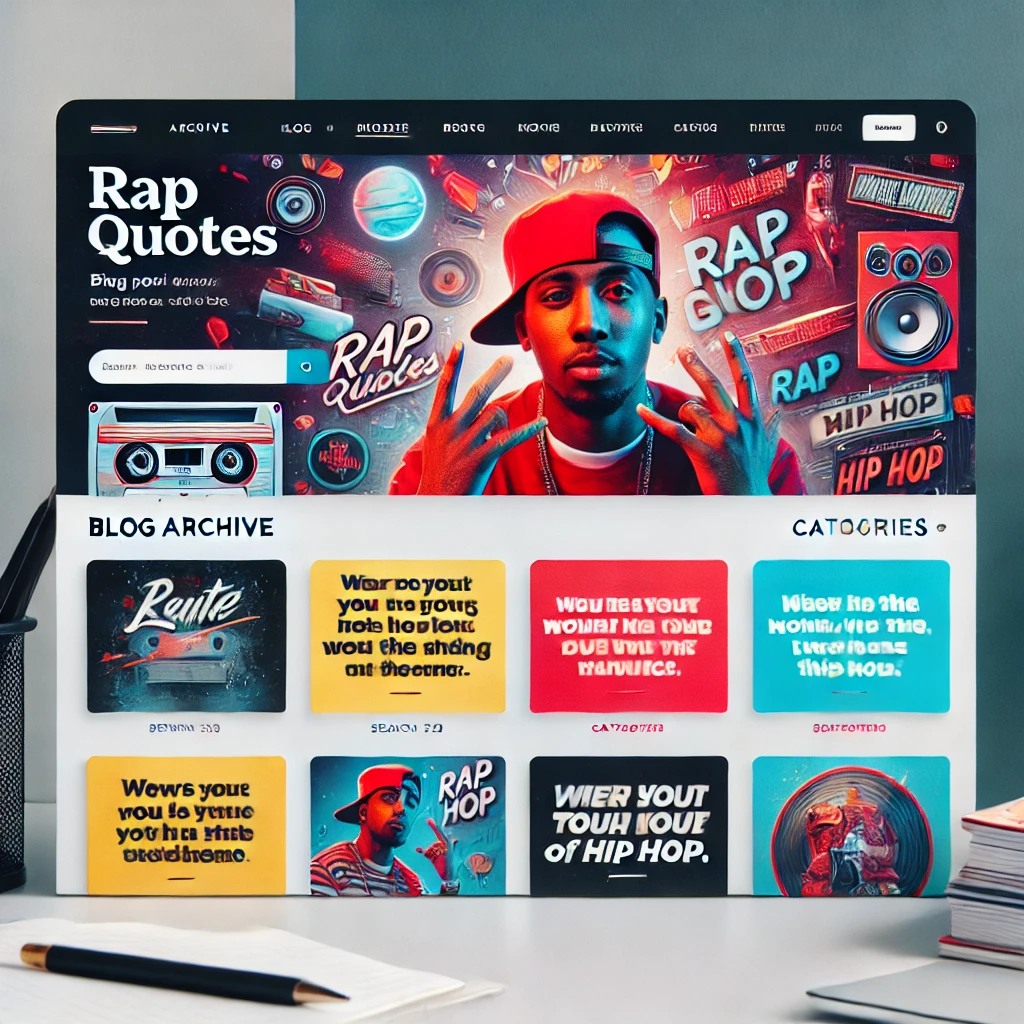Rap, more than just a genre of music, is a cultural movement that speaks to the trials, triumphs, and nuances of life. At its heart, rap is about storytelling, and lyrics serve as the vessel that conveys messages, from poetic musings to raw and unfiltered truths. Over the years, rap has evolved, yet the power of a compelling quote remains timeless. One website that has embraced this cultural movement is rap-quotes.com, where the most memorable lines from the world of rap are showcased, analyzed, and celebrated.
In this blog post, we’ll delve into the vast trove of rap quotes featured on rap-quotes.com, exploring what makes these lyrics unforgettable and examining the impact they have on both the genre and society at large.
A Rich Collection of Iconic Quotes
Rap-quotes.com serves as a dedicated resource for rap enthusiasts, offering an extensive archive of famous lines, verses, and tracks that have influenced listeners across the globe. The blog presents these quotes in a variety of formats, ranging from the emotional and motivational to the political and controversial.
Notable quotes often transcend the boundaries of music and seep into everyday conversation. Some reflect struggles with systemic issues, others focus on empowerment, while many showcase profound personal growth. A prime example of this is the iconic line by Tupac Shakur: “I am not saying I am going to change the world, but I guarantee that I will spark the brain that will change the world.” Tupac’s words have become a rallying cry for those who believe in the power of individual action to bring about wider change.
Beyond Tupac, rap has consistently provided unforgettable words that speak to generations. From Nas’ “Life’s a b***, but God forbid the b**** divorce me,”* to Kanye West’s “I’m living in that 21st century, doing something mean to it,” rap’s poets have the uncanny ability to turn everyday struggles into transcendental verses that can resonate for decades.
The Evolution of Rap Quotes
Over time, the blog archives at rap-quotes.com have chronicled how rap quotes have shifted in theme, complexity, and delivery. Early rap lyrics were often focused on party anthems, showcasing fun and celebratory lifestyles. Artists like Run DMC, LL Cool J, and Grandmaster Flash established the foundation for what would become a global genre.
However, as the genre developed in the late 80s and early 90s, so did the messages in the lyrics. Gangsta rap, led by artists like N.W.A., Snoop Dogg, and Ice Cube, brought attention to police brutality, systemic inequality, and the struggles of growing up in inner-city America. In line with this shift, rap became a medium not only for escapism but also for confronting reality.
In the 2000s, a new generation of rap stars, including Jay-Z, Eminem, and Lil Wayne, elevated the genre’s complexity with introspective bars, philosophical musings, and self-reflective lyrics. At rap-quotes.com, the archives bear witness to the rich evolution of content that defines modern rap lyrics. As the themes advanced, so did the ways in which fans viewed the artists—no longer just entertainers, but speakers of truth with the power to shape narratives and inspire thought.
Inspirational and Motivational Lines
One of the key aspects of the rap-quotes.com blog archives is its emphasis on motivational rap quotes. Many rappers have used their music to encourage their listeners to stay resilient and pursue their goals despite adversity. Artists such as Kendrick Lamar, J. Cole, and Drake are just a few who use their verses to inspire.
A powerful example is from Kendrick Lamar’s “Alright,” where the rapper chants, “We gon’ be alright.” This anthem became the soundtrack for protests, resilience, and hope in the face of social injustice. Its power lies in its simplicity, and the message is one of unity and unwavering belief in the possibility of change.
Similarly, J. Cole’s lyrics in “Love Yourz” resonate deeply with listeners. With lines like “There’s no such thing as a life that’s better than yours,” Cole emphasizes the importance of self-acceptance and contentment in an often materialistic and status-driven world.
In moments when listeners are feeling down or questioning their path, rap has consistently served as a medium of empowerment, helping them find strength in themselves.
Cultural Impact and Reflection
Rap is deeply embedded in culture. The quotes selected and featured on rap-quotes.com are more than just catchy lines; they provide a window into the social, political, and economic climates during which they were written. In a country often plagued by division and inequality, rap’s boldness in confronting such matters made it a platform for voices that were otherwise unheard.
Rap-quotes.com captures this cultural relevance, showcasing lines that make bold statements about race, identity, and class. Jay-Z’s declaration “I’m not a businessman, I’m a business, man!” encapsulates the hustler mentality that has permeated the culture, particularly in terms of self-empowerment and the quest for financial independence.
Additionally, rap quotes function as a reflection of societal values at a particular point in time. Take Kanye West’s “We’re all self-conscious. I’m just the first to admit it,” for example. His openness about vulnerability through such a high-profile platform helped normalize candid discussions about mental health in an industry typically known for its bravado.
Conclusion: The Legacy of Rap Quotes
The archives of rap-quotes.com provide us with a lens through which we can understand the evolution of hip-hop as a genre, but more importantly, how the words of legendary artists like Tupac, Nas, and Kendrick Lamar continue to resonate across generations. These artists use rap quotes not only as a way to articulate their stories, but as powerful weapons to shape the world around them. Whether they’re encouraging strength, seeking justice, or simply sharing personal triumphs, their words hold a timeless weight.
As we move forward, the quotes featured on rap-quotes.com will continue to inspire, empower, and reflect the zeitgeist of future generations, ensuring that the powerful words of rap always have a place in culture.



1 Comment
Pingback: 127.0.0.1:62893 -Localhost and Port Numbers in Networking - nymagazine.org